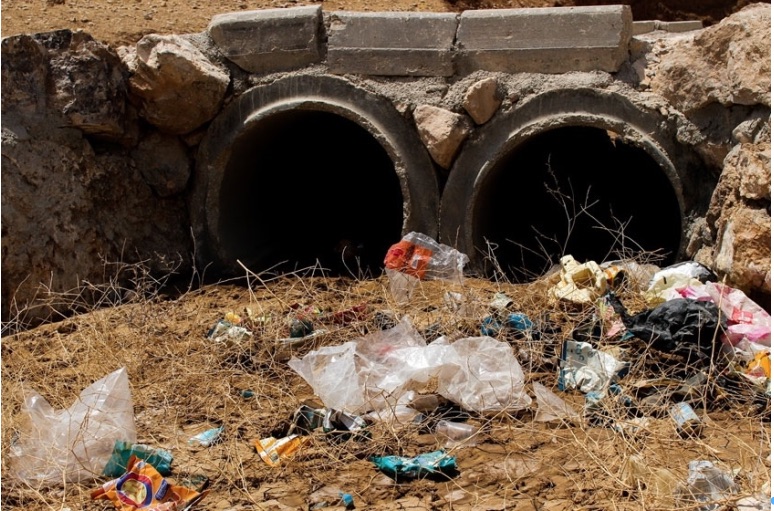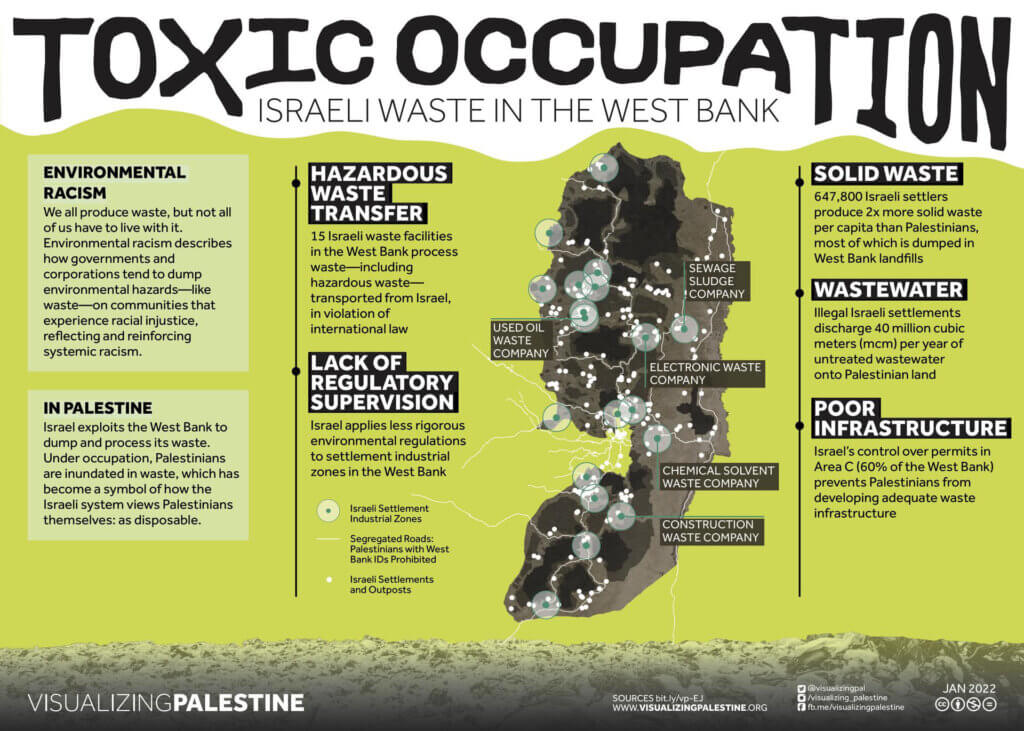Devastating environmental effects of Israeli settler-colonialism

JVL Introduction
Zubayr Alikhan , a student, activist, and writer, writing in Mondoweiss, chronicles the ongoing environmental disaster that is Israeli settler colonialism
Building settlements and the accompanying roads has in itself caused enormous harm: the clearcutting of the land occupied has, according to UNEP, led to “habitat fragmentation, desertification, land degradations, rapid urbanization, and soil erosion”.
It also causes exploitation, overuse, misuse, mismanagement, and contamination of Palestinian natural resources, particularly water.
Add to that the dumping of settlement waste in the West Bank, with vast quantities of untreated sewage, in particular, contaminating the ground water, and the open air burning of toxic waste…
Urbanisation has always been an environmental changer. Under settler colonialism is a truly a devastating environmental disaster.
This article was originally published by Mondoweiss on Mon 31 Jan 2022. Read the original here.
The devastating environmental effects of Israeli settler-colonialism in the West Bank
Ever since its genocidal birth in 1948, Israel has used settler-colonial expansion—and the urbanization of native Palestinian lands—to devastate both the indigenous Palestinian people and the natural, non-human environment. While the intense global concern about climate change is rarely applied to Israel’s catastrophic policies and practices, the inherent and inescapable illegalities of Israeli settlements, coupled with their disastrous effects on Palestinian life and natural resources, have formed the crux of the Palestinians’ rejection thereof.
Israeli settlements embody urbanization and the immense harm it poses. First, Israeli settlements are almost entirely built on confiscated Palestinian agricultural or grazing lands and are only erected after clear-cutting and uprooting local flora, namely olive trees: a primary source of food and income for Palestinians. The olive tree is also and an integral element of Palestinian identity, dating back millennia and symbolizing peace, steadfastness, fortitude, and resilience. As of 2015, the olive sub-sector constituted 15% of Palestine’s total agricultural income, supported over 100,000 Palestinian families, and provided “3 to 4 million days of seasonal employment per year”. Not only are Palestinian olive trees clear-cut to construct Israel’s illegal settlements, but according to the United Nations, are also “subject to fire, uprooting and vandalism by settlers”. Conservative estimates taken in 2011—after which Israel has only intensified its colonial efforts—revealed that nearly 1 million Palestinian olive trees have been uprooted and destroyed in a settler-colonial attempt to erase all traces of Palestinian heritage, culture, and existence.
According to a 2020 United Nations Environment Programme (UNEP) report, the destruction of Palestinian olive trees — a cog in the greater, well-oiled Israeli mechanism of ethnic cleansing — coupled with the strategic expansion of illegal Israeli settlements, has devastated terrestrial ecosystems, causing severe “habitat fragmentation, desertification, land degradations, rapid urbanization, and soil erosion”. The UNEP went on to state that the process of urbanization through the “removal of rocks for construction, the uprooting of trees, invasive species [most often imported by the Israeli government and settlers to ‘Europeanize’ the land], [and] pollution…[is] threatening habitats and species.” The cruel, discriminatory measures Israel imposes upon Palestinians has led, among other issues, to a drastic decrease in agricultural productivity—and hence economic growth and stability—across Palestine.
The effect of urbanization on local fauna is equally frightening. The previously diverse Palestinian fauna is under imminent threat. Israel’s construction of roads, the methods used to do so, and a sheer disregard for their ecological ramifications all threaten and harm Palestinian wildlife. Israeli forces often drill deep into mountains—inhabited by a wide range of natural fauna—thereby both displacing local wildlife populations, inhibiting their natural migrations, and resulting in a spike in animal deaths through roadkill. Furthermore, the destruction of the animals’ natural habitat—particularly their breeding and nesting sites—through “extensive land leveling and the fencing-off of settlement perimeters” has disrupted natural passageways, endangered many species, and caused severe imbalances in their population number and reproduction rates, affecting the food chain and local ecosystem as a whole.
Yet another area where the damaging effects of urbanization can be observed is the exploitation, overuse, misuse, mismanagement, and contamination of Palestinian natural resources. Israeli settler communities confiscate and maintain a policy of domination over Palestinian water sources. According to a 2012 report issued by the French Parliament’s Foreign Affairs Committee, “Some 450,000 Israeli settlers on the West Bank use more water than the 2.3 million Palestinians that live there. In times of drought, in contravention of international law, the settlers get priority for water”. Moreover, B’Tselem—Israel’s largest and most well respected human rights group—stated that while Israelis consume a whopping “242 liters of water per person every day…Palestinians consume…as little as 20 liters per day in some areas”. This, of course, is “dramatically less than the 100 liters that the World Health Organisation recommends as the minimum quantity for basic [water] consumption”.

Urbanization is also known to result in waste management and disposal issues, which can have horrifying effects. Israel dumps 80% of the waste products generated from Israeli settlements in the occupied West Bank. This in turn, “[pollutes] the Palestinian earth and water supply, while Israeli settlers in the West Bank – who produce similar amounts of wastewater to the Palestinian population, despite being outnumbered more than six to one – deliberately poison the water, land and livestock of nearby Palestinian villages”. This means that every year over “2 million cubic metres of raw [untreated] sewage flow into the valleys of streams of the [Palestinian] West Bank…[causing] severe damage through the West Bank…[and] the contamination of mountain groundwater” which is widely considered the greatest source of water in the region. Unsurprisingly, this gargantuan dumping of Israeli waste into Palestinian lands contaminates water supplies, rendering them unsuitable for human consumption and crop cultivation. Additionally, in an intensely disturbing manifestation of its racist, Jewish-supremacist, apartheid policies, Israel transferred a number of polluting factories where “solid waste…is burned in open air” producing “carcinogenic chemical emissions” into the Palestinian West Bank, in order to protect the Israeli public.
Urbanization—particularly when implemented in the process of settler-colonization—is devastating to the environment, and perhaps more importantly, to the lives of the indigenous people who ever so affectionately call the land home. The burden of the earth’s protection lies upon the shoulders of these individuals, and the bodies erected to represent their interests. It is our duty to hold the perpetrators of such environmental and humanitarian crimes accountable and ensure that future generations see a free and vibrant green planet, not one drowning in the menacing, ominous grays of settler-colonial urban civilization.
Zubayr Alikhan is a student, activist, and writer whose primary focus is on the pursuit of justice with a particular emphasis on international human rights, anti-colonial resistance, and legal accountability. He writes on issues highlighting oppression and tyranny around the world.

“First, Israeli settlements are almost entirely built on confiscated Palestinian agricultural or grazing lands and are only erected after clear-cutting and uprooting local flora, namely olive trees: a primary source of food and income for Palestinians. The olive tree is also and an integral element of Palestinian identity, dating back millennia and symbolizing peace, steadfastness, fortitude, and resilience.”
So re. the fate of Palestinian olive trees:
I heard on the Today Programme (18/12/2020) the “Thought for the Day” delivered by Bishop James Jones, in appreciation of the late Lord Sacks. It had relevance to the occupation of Palestine.
The bit in question is repeated below. The full original may still be available on the BBC Today website.
============================
Some years ago I spent time listening to young people’s dreams and dreads about the future. It made me re-think my own attitude to the environment. What did Jesus have to say about the earth? What were the Jewish and Muslim ethics of Creation?
I went to see the late Rabbi Lord Jonathan Sacks. When I ventured that Jews might begin with Genesis he stopped me.
‘No, James. That’s a very Christian way of reading the Bible on this subject!’
‘No’, he repeated, ‘we start in Deuteronomy with God’s instruction to Moses that as they entered the Promised Land they were never to destroy a fruit bearing tree.’ Long before anyone knew the science of climate change there was a religious intuition that trees were central to our ecology.
Just as I was leaving this ‘masterclass’ he posed a question. ‘Do you know what the three most extraordinary words of Jesus were?’ Here was the Chief Rabbi putting a Christian bishop on the spot about Jesus, and I didn’t know the answer.
He raised his eyebrows, ‘But I say’. Apparently there’s no evidence from that period of a rabbi saying as Jesus did, ‘You’ve heard it said, but I say …’.
===============================
Had “God’s instruction to Moses” stood the test of time, today thousands of “fruit bearing trees”, along with the olive tree farmers, their homes, Palestine infrastructure and freedom would not have been destroyed, or continue to be destroyed.
I found the unconscious irony revealed on the part of Lord Sacks, as related by Bishop James Jones, and the Bishop’s failure to recognise and question it, truly staggering.
Excellent piece ! Another crucial aspect of the Israeli state’s actions
Israel claims to make the desert bloom. Yet this is at the expense of destroying Palestinian lives, their villages, their delicate agriculture and landscape creation that respected and enhanced the environment. The development of Israeli cities, towns, moshavim and kibbutzim, and now the illegal hilltops and settlements, all on stolen land, was done with main aim of imposing Jewish hegemony on the backs of the erasure of Palestine.All this with ruthless disregard for the environment, resulting in the catastrophe of full blooded settler colonialism. All these crimes against humanity must be adjudicated in the ICC, and Israel brought to account by the United Nations acting with one voice.
Additionally, I find it very disturbing that these ‘settlers’ raise their children to despise another racial group, and to be happy to hurt these people and destroy their homes and livelihoods. dispose their livelihoods. Israel is a breeding ground for the ‘settlers’ and thus a breeding ground for racist ideas and belief in their own superiority and indifference to other human beings. Of course the world should never forget the Holocaust. But what is the point when the very people who were the subject of such racist hatred and unspeakable cruelty, are themselves creating hatred ad sanctioning hateful behaviour against another race of people, while hiding behind the ‘victim of the holocaust’ label.